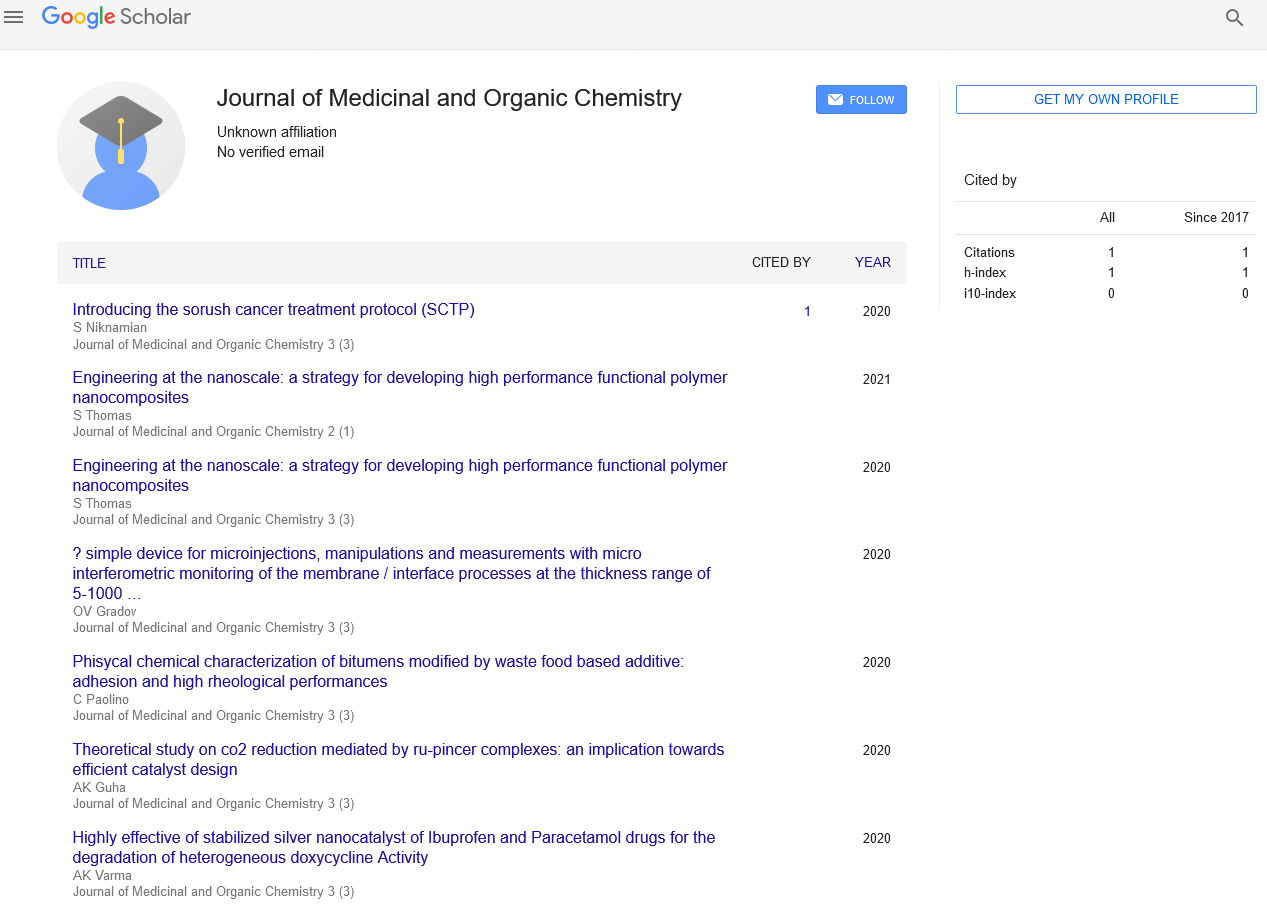Mini Review - Journal of Medicinal and Organic Chemistry (2023) Volume 6, Issue 4
Understanding Immunology: The Intricacies of our Immune System
Dr. Nayna Madhu*
Department of Immunology Science, Institute of CN Medical Science and Technology, India
Department of Immunology Science, Institute of CN Medical Science and Technology, India
E-mail: madhu.n@gmail.com
Received: 01-August-2023, Manuscript No. jmoc-23-110316; Editor assigned: 03-August-2023, PreQC No. jmoc-23-110316; Reviewed: 17-August-2023, QC No. jmoc-23-110316; Revised: 23-August-2023, Manuscript No. jmoc-23-110316 (R); Published: 30-August-2023; DOI: 10.37532/ jmoc.2023.6(4).96-99
Abstract
Immunology is a branch of biomedical science that focuses on the study of the immune system and its intricate interactions with various biological entities. The immune system plays a pivotal role in defending the body against pathogens, such as bacteria, viruses, and fungi, as well as abnormal cells, like cancer cells. This dynamic system comprises a network of cells, tissues, and molecules that work collaboratively to maintain homeostasis, detect and eliminate threats, and develop immunological memory. Advances in immunology have led to the development of vaccines, therapies for autoimmune diseases, and a deeper understanding of immune-related disorders. This abstract provides an overview of key concepts in immunology, including the immune response, immune cell types, signaling pathways, immunotherapy, and the importance of immunological research in improving human health. Immunology, a field at the intersection of biology and medicine, explores the intricate defense mechanisms that organisms employ to safeguard themselves against pathogens, while also maintaining tolerance towards self-components. This discipline delves into the complexities of immune responses, ranging from the recognition of foreign invaders to the orchestration of immune reactions. Through the study of immunology, researchers gain insights into disease pathogenesis, vaccine development, organ transplantation, and autoimmunity, thereby contributing to advancements in both basic science and clinical practice. This abstract provides an overview of the fundamental concepts and significance of immunology as a key player in maintaining health and combating diseases.
Keywords
Immunology • Immune system • Immune response • Pathogens • Immunity • Immune cells • Antibodies • Atigens, immunological memory • Vaccines • Autoimmune diseases • Signalling pathways • Immunotherapy • Immune-related disorders • Biomedical science
Introduction
The immune system constitutes a remarkable array of cells, molecules, and processes that collectively function as the body’s defense mechanism. By distinguishing between “self” and “non-self,” the immune system plays an indispensable role in maintaining homeostasis, combating infections, and even surveilling for abnormal cellular growth. Immunology, the study of this intricate system, has made significant strides in unraveling the mechanisms that govern immune responses, leading to breakthroughs in medical science.
Immunology, a branch of biomedical science, focuses on the study of the immune system - the complex network of cells, tissues, and molecules that work in unison to defend our bodies against harmful invaders. From bacteria to viruses and even cancer cells, our immune system plays a critical role in maintaining our health. This article delves into the fascinating world of immunology, exploring the components of the immune system, how it functions, and its significance in maintaining overall well-being. From early observations of infectious disease susceptibility to the development of modern immunotherapies, the journey of immunology has been marked by transformative discoveries. Edward Jenner’s pioneering work with cowpox laid the foundation for vaccination, while the elucidation of antibody structure by Rodney Porter and Gerald Edelman provided insights into humoral immunity. The unraveling of major histocompatibility complex (MHC) molecules, responsible for antigen presentation, opened doors to understanding transplant rejection and immune tolerance. The advent of cellular immunology revealed the roles of T cells and their diverse functions. In this review, we delve into the foundational principles of immunology, encompassing the cellular and molecular components of the immune system, the mechanisms underlying immune responses, and the implications of immunological research in clinical settings. Through a comprehensive exploration of immunology’s past and present, we aim to highlight its central role in health and disease, fostering an appreciation for the ongoing efforts to decipher the immune system’s complexities and exploit its potential for therapeutic interventions [1-5].
Components of the immune system: The cellular army At the heart of the immune system lies a remarkable array of specialized cells, each with distinct functions. These cells work together in an orchestrated manner to recognize and eliminate potential threats. Some of the key players include:
White blood cells (leukocytes): These cells form the core of the immune system. They are broadly categorized into two groups: innate immune cells and adaptive immune cells. Innate immune cells, such as neutrophils and macrophages, provide immediate but generalized responses to infections. Adaptive immune cells, including T cells and B cells, create specific responses tailored to the invader.
T lymphocytes (T cells): T cells play a pivotal role in orchestrating immune responses. Helper T cells stimulate other immune cells to enhance their activity, while cytotoxic T cells directly attack infected or cancerous cells.
B lymphocytes (B cells): B cells are responsible for producing antibodies, specialized proteins that neutralize or mark pathogens for destruction. This process is known as humoral immunity and is a crucial part of the adaptive immune response.
Natural killer (NK) cells: NK cells are a type of lymphocyte that provides rapid responses to viral-infected cells and tumor cells. They are part of the innate immune system and can directly kill abnormal cells.
Dendritic cells: Dendritic cells are sentinels that patrol the body, capturing antigens (foreign molecules) from invaders and presenting them to T cells, thereby initiating immune responses.
Immune response: Recognize, React, Remember
When a foreign substance, known as an antigen, enters the body, the immune system goes into action. The immune response can be broadly divided into several stages:
Recognition: Immune cells, particularly dendritic cells, recognize antigens and present them to T cells. This step is crucial as it triggers the activation of other immune cells.
Activation: Once T cells recognize the presented antigens, they become activated. Helper T cells stimulate other immune cells, while cytotoxic T cells directly target infected or abnormal cells.
Antibody production: B cells encounter antigens and produce antibodies that bind to the invaders. This marks the invaders for destruction by other immune cells.
Elimination: Effector cells, such as cytotoxic T cells and phagocytes (e.g., neutrophils, macrophages), work together to eliminate the invaders. Antibodies also play a role in neutralizing pathogens.
Memory formation: After successfully combating an infection, the immune system retains a memory of the pathogen. This memory allows for a quicker and more robust response upon subsequent encounters with the same pathogen, providing immunity.
Immune system disorders: A balancing act
While the immune system is remarkably efficient, it’s not invulnerable to dysfunction. Immune system disorders can manifest in various ways, such as autoimmune diseases, allergies, and immunodeficiencies.
Autoimmune diseases: In autoimmune diseases like rheumatoid arthritis, multiple sclerosis, and lupus, the immune system mistakenly attacks the body’s own tissues, leading to chronic inflammation and damage.
Allergies: Allergic reactions occur when the immune system overreacts to harmless substances, triggering symptoms such as sneezing, itching, and difficulty breathing.
Anaphylaxis is a severe and potentially lifethreatening allergic reaction.
Immunodeficiencies: Immunodeficiency disorders weaken the immune system’s ability to fight infections. Conditions like HIV/AIDS compromise the function of T cells, leaving the body susceptible to opportunistic infections.
Immunotherapy: Harnessing the Immune System for Treatment
Recent advances in immunology have paved the way for groundbreaking medical treatments known as immunotherapies. These therapies manipulate the immune system to treat diseases such as cancer and autoimmune disorders.
Cancer immunotherapy: Checkpoint inhibitors and CAR T-cell therapies are examples of cancer immunotherapies. Checkpoint inhibitors remove barriers that cancer cells exploit to evade the immune system, while CAR T-cell therapy involves genetically modifying a patient’s T cells to target and destroy cancer cells.
Allergen Immunotherapy: For severe allergies, allergen immunotherapy gradually exposes patients to small amounts of allergens, desensitizing the immune system and reducing allergic reactions [6-10].
Maintaining a healthy immune system: Lifestyle matters
Several factors influence the efficiency of our immune system:
Nutrition: A balanced diet rich in vitamins, minerals, and antioxidants supports immune function.
Sleep: Adequate sleep is essential for immune system restoration and function.
Physical activity: Regular exercise promotes immune cell circulation and enhances overall immune function.
Stress Management: Chronic stress can weaken the immune response, so stress reduction techniques are important.
The immune system: A marvel of complexity Immunology showcases the intricate interactions that safeguard our health. From the cellular warriors to the orchestrated responses, the immune system is a masterpiece of nature’s design. As our understanding deepens, immunology continues to inspire medical breakthroughs, revolutionizing the treatment of diseases and ultimately contributing to our quest for healthier lives.
Conclusion
The field of immunology is a cornerstone of our understanding of how the immune system functions to protect the body against pathogens while maintaining selftolerance. Through decades of research and advancements, we have gained insights into the intricate mechanisms that govern immune responses, ranging from innate immunity’s rapid defense mechanisms to the adaptive immune system’s ability to develop specific, long-lasting protection. Immunological research has not only led to breakthroughs in medical science, such as the development of vaccines and immunotherapies, but has also deepened our comprehension of various diseases, including autoimmune disorders, allergies, and immunodeficiencies. The field’s ever-evolving nature continues to provide opportunities for innovative treatments and interventions, offering hope for addressing previously intractable health challenges.
As technology advances, techniques like high-throughput sequencing, single-cell analysis, and computational modeling are revolutionizing immunological research, enabling us to explore the immune system’s complexities with unprecedented detail. This progress holds promise for personalized medicine, where treatments can be tailored to an individual’s unique immune profile.
Looking ahead, collaboration between immunologists, clinicians, and researchers from various disciplines will be crucial for tackling the challenges that lie ahead. By deciphering the intricacies of immune responses, we can unlock new avenues for disease prevention, innovative therapies, and improved well-being for individuals across the globe. Immunology will undoubtedly continue to shape the future of medicine and contribute to our broader understanding of human health and biology.
References
- Lutsey PL, Steffen LM, Stevens J. Dietary intake and the development of the metabolic syndrome: the atherosclerosis risk in communities study. Circulation.117,754-761 (2008).
- Slavkin, Harold C. Evolution of the scientific basis for dentistry and its impact on dental education, past, present, and future. Journal of Dental Education. 76, 28-35(2012).
- Leggat PA. Occupational hygiene practices of dentists in southern Thailand. International Dental Journal. 51, 11-16(2001).
- Angum, Fariha, Khan. The Prevalence of Autoimmune Disorders in Women, A Narrative Review. Cureus. 12, 80-94 (2020).
- Meldrum OW, Chotirmall SH. Mucus, Microbiomes and Pulmonary Disease. Biomedicines. 9, 675 (2021).
- Lennon MA. One in a million: the first community trial of water fluoridation. Bulletin of the World Health Organization. 84, 759-760(2006).
- Leggat PA. Occupational Health Problems in Modern Dentistry: A Review. Industrial Health. 45, 611-621 (2007).
- Huang ES, Brown SE, Ewigman BG et al. (2007) Patient perceptions of quality of life with diabetes-related complications and treatments. Diabetes Care. 30, 2478-2483.
- Buehler AM, Cavalcanti AB, Berwanger O et al. Effect of tight blood glucose control versus conventional control in patients with type 2 diabetes mellitus: a systematic review with meta-analysis of randomized controlled trials. Cardiovascular Therapeutics. 31, 147-160 (2013).
- Huang ES, Brown SE, Ewigman BG et al. Patient perceptions of quality of life with diabetes-related complications and treatments. Diabetes Care. 30, 2478-2483 (2007).
Indexed at, Google Scholar, Crossref
Indexed at, Google Scholar, Crossref
Indexed at, Google Scholar, Crossref
Indexed at, Google Scholar, Crossref
Indexed at, Google Scholar, Crossref
Indexed at, Google Scholar, Crossref
Indexed at, Google Scholar, Crossref
Indexed at, Google Scholar, Crossref
Indexed at, Google Scholar, Crossref

